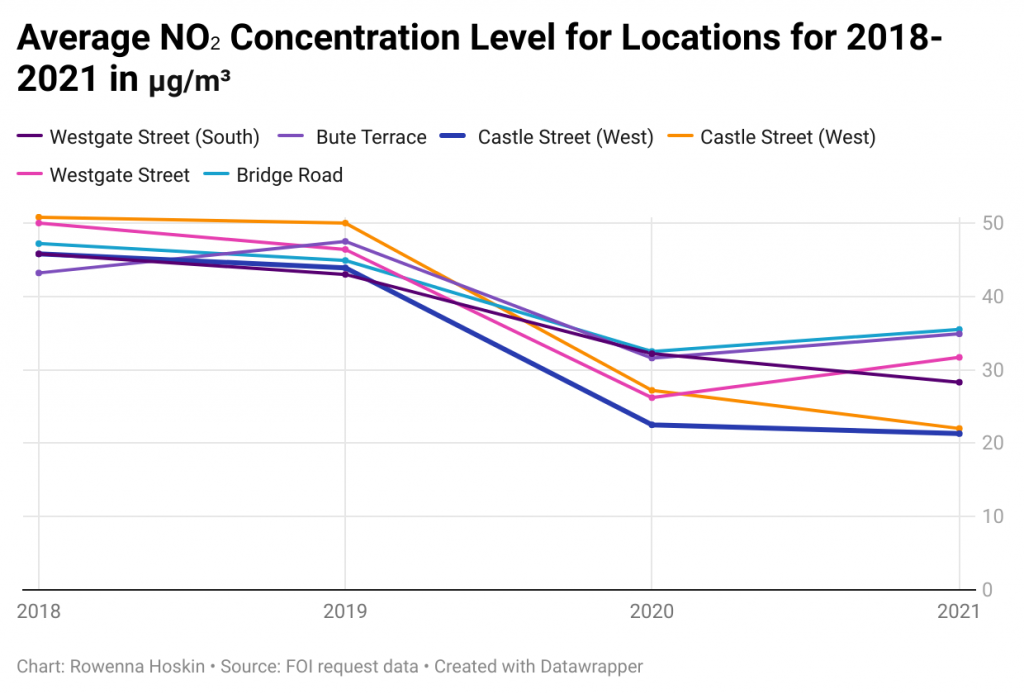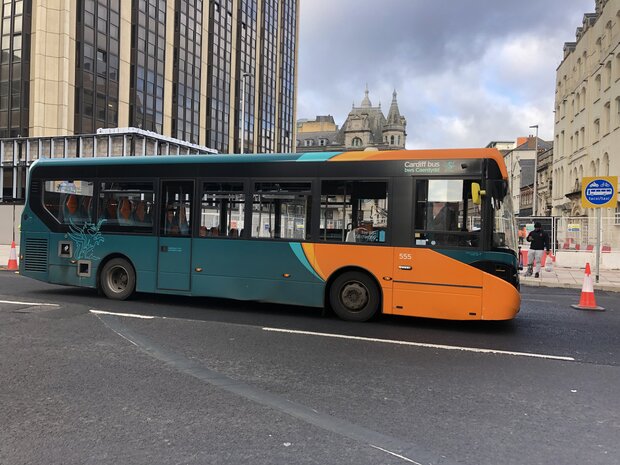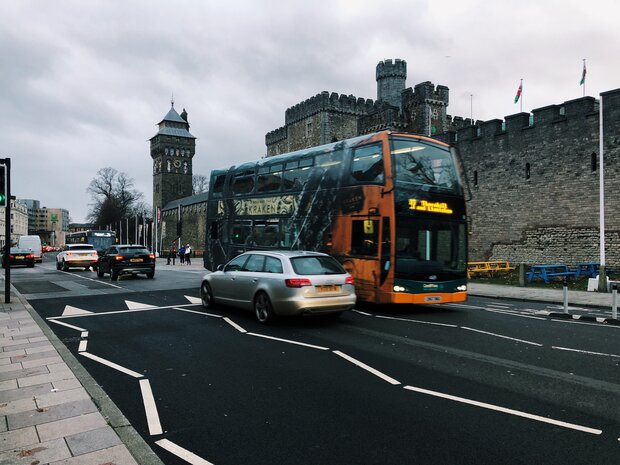Quality improves by 57% since 2018 but Cardiff Council urged to do more to persuade people to leave their cars at home
AN FOI request from The Cardiffian shows that the eight locations in the city where Nitrogen Dioxide levels were over the 40 micrograms per cubic metre (µg/m³) limit are all now within legal levels.
The areas which recorded the high levels in 2018 were two locations on Westgate Street, Bute Terrace, two locations on Castle Street, and Bridge Road between Llandaff and Llandaff North.
All the monitoring stations are on very busy roads into, out of or across the city centre, which explains the high pollution levels.
Poor air quality is the largest environmental risk to public health in the UK according to the World Health Organisation.
Councillor Caro Wild said: “We agree with the WHO that there is no safe limit, that is why our policy is not just to reach under 40 everywhere, our policy is to keep trying to get these figures lower.”
The Welsh government is legally obliged (under 2010 legislation) to keep levels of Nitrogen Dioxide (NO2) below an annual average of 40 micrograms per cubic metre (µg/m³) each year.
NO2 is formed in vehicle combustion as the heat in the engine catalyses the reaction between atmospheric Nitrogen and Oxygen.

The worst street in 2018 was Castle Street, which is now the 35th most polluted having improved by 57%.
During the pandemic the street was pedestrianised in order to allow businesses to continue trading outside. In 2020 the street was opened to buses and taxis but remained shut to private cars.
The street was then reopened to all traffic this summer following a public consultation that saw 53.8% of the 6,227 votes in favour of re-opening it.
Joseph Carter, the chair of Healthy Air Cymru said: “We disputed the council predictions that air pollution levels would increase in other places in the city should Castle Street remain closed. We argued that as time went on and people changed their routes and travel habits, combined with 20 mph zones, there would be long term gains of keeping it closed.”
Castle street (west) was measured at Angel Hotel. Its annual average was 50.8ug/m3 in 2018 and was reduced to 22ug/m3 when it was fully reopened this year.

Westgate Street was recently closed to private cars in order to make it a bus gate. This is in line with the council’s One Planet Cardiff project which aims to improve the city’s air quality by encouraging walking, cycling and public transport use.
Westgate Street (North) was 45.8 ug/m3 in 2018 and 28.3 ug/m3 in 2021. Westgate Street (South) was 50 ug/m3 in 2018 and was 31.7 ug/m3 in 2021.
In an effort to improve the city’s air quality, Cardiff Council have a series of projects and plans in place to keep the pollution levels below the 40ug/m3 limit.
One of which is their Clean Air Plan which involves the introduction of 36 electric buses, 49 retrofitted buses and the lease of electric taxis.
The Council has also followed in Swansea and Newport’s footsteps with a new bus scheme. They have promoted £1 bus tickets after 9.30am between the 3rd of December and December 16th Monday to Friday.
Adrian Field, Executive Director of FOR Cardiff, said: “This is a great offer to ensure that people consider a green and cheaper option in order to venture into the city centre for shopping, leisure or work at such a crucial time for businesses.
“It will be really interesting to utilise the data as well to see what the demand will be and if it is a strong enough offer to elicit a change in people’s travel habits and perceptions.”

Councillor Caro Wild said: “We hope that as many people as possible take advantage of this offer, and by working with all the bus companies operating in Cardiff, we intend to explore other incentive schemes to make bus travel a more attractive and viable option for both residents and commuters to use.”
He explained that in the wake of COVID the number of people cycling and walking into Cardiff have increased but car use is also high and back up to pre-COVID levels despite people working from home still affecting the numbers.
“We think that’s due to a number of factors, including people feeling a bit unsure about it. So, this is an incentive to try and help get those numbers back up, in particular in the run up to Christmas. We want to help the City Centre economy, but we don’t want them to do it by car,” said Coun Wild.
But not all the council’s transport policies have been praised for their environmental credentials.
Joseph Carter added: “Until very recently the council have been advertising their new app to help find people a car parking space. It was everywhere, they were really pushing it. This is completely the opposite of what we want. We don’t want people to drive to see the Cardiff lights or to go Christmas shopping.
“The council haven’t helped themselves. It is good they have introduced the £1 Bus scheme, but it’s come very late. The plans Swansea and Newport have been more ambitious with free bus tickets, we would have liked Cardiff to have gone further.
“We need to see more bus investment if Cardiff is truly going to take steps to reduce the air pollution.”



